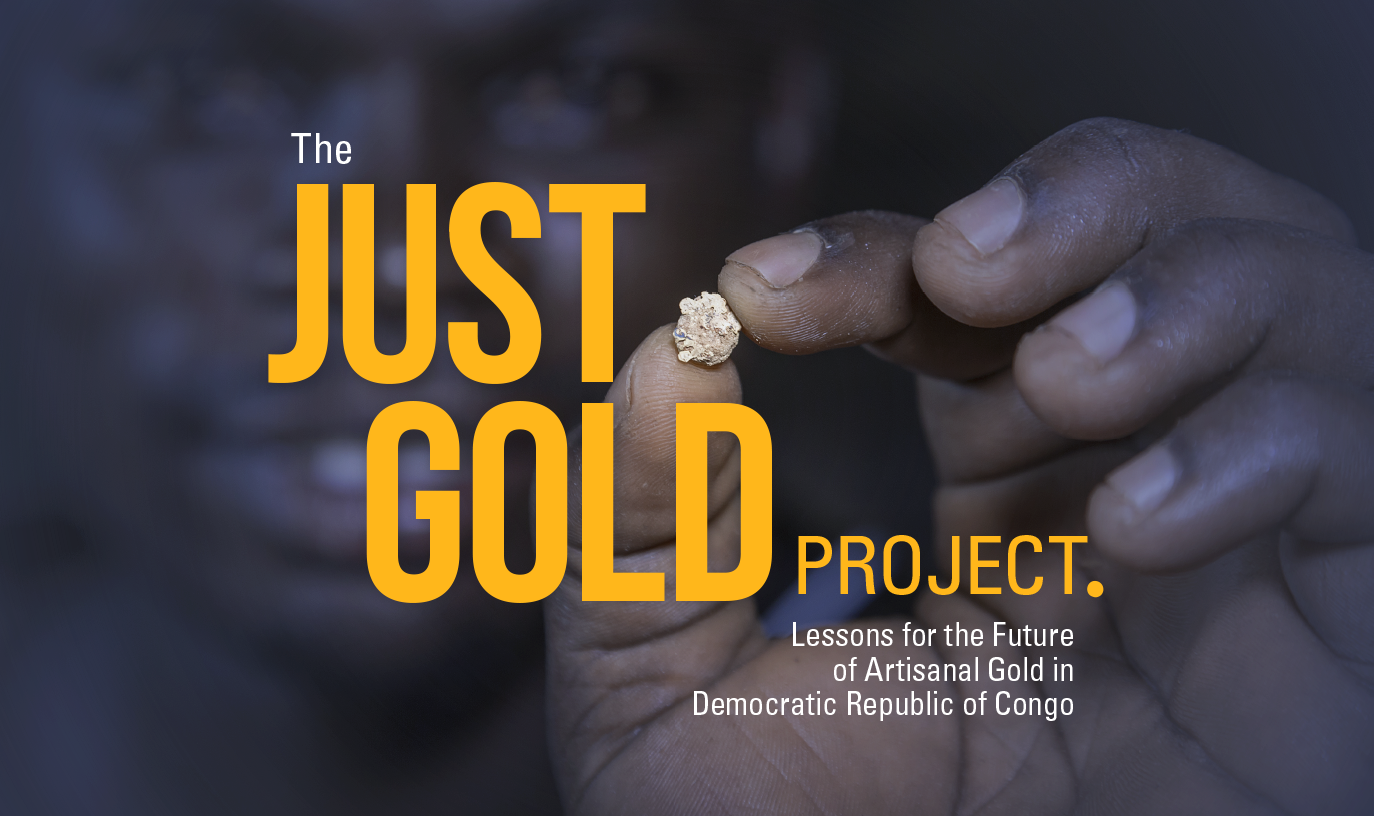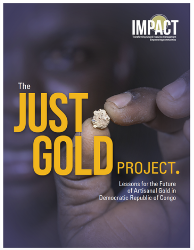Ottawa, Canada—March 31, 2021
Until the gold industry, donors, and consumers prioritize and support a development and rights-based approach that leverages the market, the future is unpromising for conflict-free, traceable, responsible gold from Democratic Republic of Congo (DRC).
So concludes the latest report from IMPACT based on its experiences implementing the Just Gold project in DRC from 2012 to 2020 which sought to test whether and how artisanal gold could be traced from mine site to market. The report promotes transparency to assist others committed to supporting security, development, and equality for women and men miners and artisanal and small-scale mining (ASM) communities.
IMPACT undertook the critical evaluation outlined in The Just Gold Project: Lessons for the Future of Artisanal Gold in Democratic Republic of Congo as a way to help ensure people in conflict-affected and high-risk areas are not left behind by the tide of global attention on the ASM sector.
Read about IMPACT’s experiences and lessons learned from implementing the Just Gold project in Democratic Republic of Congo from 2012 to 2020.
While IMPACT applauds the increased demand for responsibly sourced gold, supply is contingent upon the gold industry adapting to local realities in producer communities.
“Companies could be ensuring supply chains are conflict-free, benefiting local communities, and contributing to equitable peace and development,” says Joanne Lebert, Executive Director of IMPACT.
“However, responsible sourcing has failed to move beyond an avoidance-type approach to supply chain management where companies simply altogether avoid sourcing from certain regions.”
The report outlines the many barriers preventing the vast majority of artisanal miners from meeting the market’s expectations.
Barriers include not enough gold volume from validated conflict-free sites, insufficient or inconsistent inventory financing, and a market that places undue expectations on DRC’s artisanal actors, resulting in actors unwilling to purchase DRC gold. Furthermore, the gold is simply too expensive. For example, taxes and transportation are costly in a context where there is low infrastructure and administrative inefficiencies, pushing prices beyond what the gold industry is willing to pay.
The Just Gold project works with miners, traders, and exporters to create incentives for legal sales and provides capacity building to implement the traceability and due diligence required by the project, in alignment with regional and international standards. The project first started in the former Orientale Province in 2012 and as of 2015, in Ituri Province directly supporting a local artisanal mining cooperative to implement traceability and due diligence.
The project brought the first conflict-free, traceable, and legal artisanal gold from DRC to the international market in 2017.
Between 2017-2019, over 24 kg of gold made its way from participating women and men miners and cooperative members onto the international market.
IMPACT is now focusing its work to pursuing systemic changes that will support the commercial viability of responsible supply chains in DRC, including:
- making the export process more efficient
- improving the fiscal environment so it does not disincentivize legal trade
- ending impunity for the worst offenders amongst illicit traders and smuggling networks which extend into neighbouring countries and trading centres, such as the United Arab Emirates
- adapting support to ASM actors and communities who cannot access the international market on their own
For there to be a future for conflict-free, traceable, responsible gold, IMPACT calls on the gold industry, donors, and consumers to:
- support a development and rights-based approach when engaging with the world’s most marginalized in this sector
- recognize the potential of ASM in supporting development and the precariousness of people in the sector, particularly in conflict-affected contexts
- provide immediate rewards to local actors to incentivize and sustain improved conditions at least until basic economic security is achieved
Download the full report here.
-30-
Media contact:
Zuzia Danielski
Communications Director, IMPACT
+1-613-237-6768 ext 310 / +1-613-263-0661
zdanielski@impacttransform.org
IMPACT, formerly Partnership Africa Canada, transforms how natural resources are managed in areas where security and human rights are at risk. We investigate and develop approaches for natural resources to improve security, development, and equality. We are an independent non-profit collaborating with local partners for lasting change.


